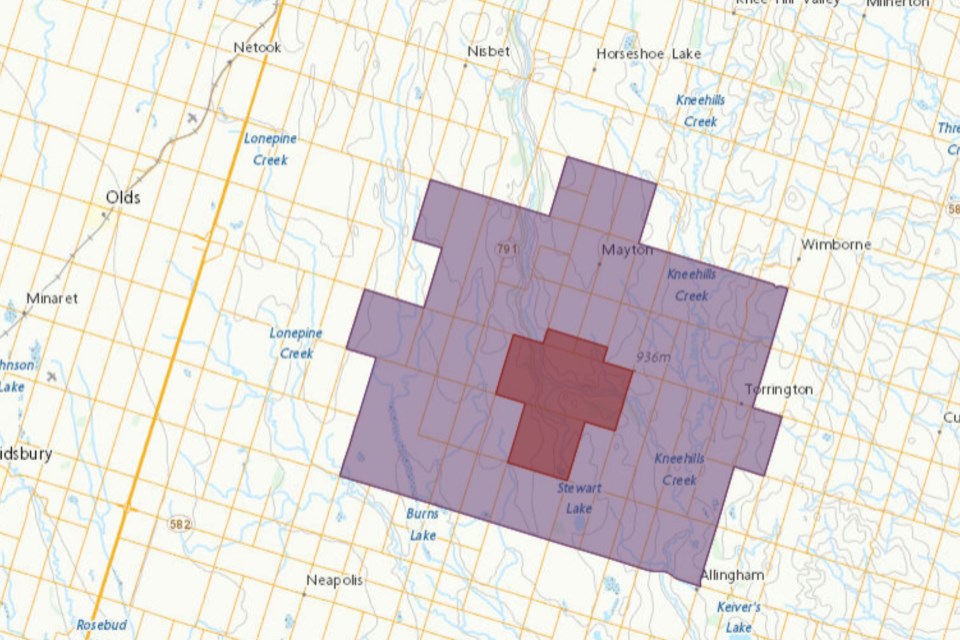MOUNTAIN VIEW COUNTY - Movement of birds and their products and by-products are no longer restricted in control zones anywhere in Canada due to H5N1 highly pathogenic avian influenza outbreaks with the lifting of restrictions in Mountain View County last week.
On Friday, June 28, the Canadian Food Inspection Agency (CFIA) revoked the primary control zone (PCZ) it enacted around a Mountain View County property on Feb. 21 after a bird flu outbreak was declared there a few days earlier.
As a result of the declaration, birds, their products and by-products, as well as things exposed to birds could not be moved into, out of, within, or through a PCZ except by permission of the agency.
The affected property was a commercial hunt farm with pheasants, partridges and chicken layers. According to the World Organisation for Animal Health, out of a total of 3,862 susceptible birds, there were 1,200 cases found resulting in the death of all 1,200 birds. The remaining 2,662 birds were killed and disposed of.
Restrictions on the province’s only other H5N1 highly pathogenic avian influenza outbreak of 2024 so far were lifted a few days before the Mountain View County case.
The PCZ for the outbreak in Vermillion River County was revoked June 26.
That was the province’s first outbreak of 2024 which was detected at a non-commercial backyard poultry farm on Feb. 9.
According to the World Organisation for Animal Health, out of 90 susceptible birds at the Vermillion River County property, there were 84 cases found resulting in the death of all 84. The remaining six birds were killed and disposed of.
A PCZ was not enacted for the country's most recent outbreak at a non-commercial, non-poultry premisis in quebec on April 10.
According to the CFIA, wild birds, especially waterfowl, are natural reservoirs of influenza viruses. They are not normally affected by the disease, but can still transmit it to domestic birds. The disease can spread to birds through contact with infected poultry and poultry products. It can also spread through contaminated manure, litter, clothing, footwear, vehicles, equipment, feed and water.
In 2024, there have been nine outbreaks of the disease in Canada including in Quebec, Nova Scotia, Saskatchewan and Ontario.
A highly pathogenic strain of avian influenza was found in North America in a few wild birds in 2015, says the CFIA but seemed to disappear in 2016-2017. In late 2021, a highly pathogenic avian influenza--H5N1 North American strain—was detected in Canada in domestic and wild birds. Significant mortality was documented in domestic poultry in some maritime provinces.
Through 2022, an outbreak of highly pathogenic avian influenza, an H5N1 strain, occurred in wild and domestic birds across Canada and the U.S.A. In Alberta, the outbreak began in early April 2022. In 2022, there were 60 outbreaks in Alberta, including seven in Mountain View County. Through the spring and fall of 2022, the disease triggered the on-farm culling of over 1.4 million birds in Alberta and untold economic losses.
In 2023, there were 20 outbreaks in Alberta, with none occurring in Mountain View County.
As of early April 2024, CFIA says the estimated number of birds in Canadian flocks impacted by highly pathogenic avian influenza in the current outbreak is 11,030,500.
The disease continues to infect non-poulty animals as well, including dairy cattle in the U.S.
The United States Department of Agriculture (USDA) has also detected highly pathogenic avian influenza in unpasteurized milk from dairy cattle in some areas of the United States.
Affected cows are showing clinical signs that include a decrease in milk production, thicker consistency milk and a decrease in feed consumption.
The CFIA says highly pathogenic avian influenza has not been detected in dairy cattle or other livestock in Canada to date.
As of June 18, 2024, CFIA laboratories tested 600 retail milk samples from across Canada. All samples have tested negative for HPAI fragments, with no evidence of disease in dairy cattle detected in milk.



